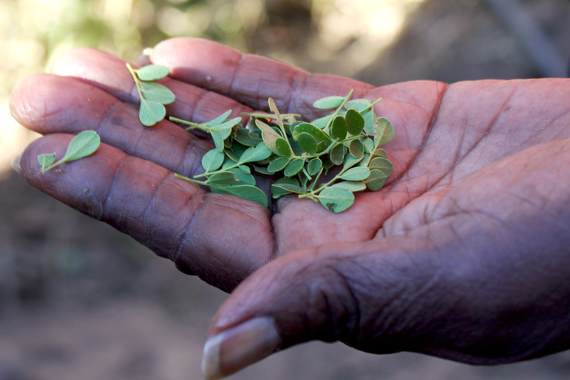Moringa is known throughout the world as a miracle tree. But, what exactly is moringa and why is research buzzing about the possible health benefits of this hearty plant?
Moringa is a tree that is an important crop native to India and currently grown throughout the world in Latin America, Southeast Asia and Africa. The entire tree is edible, from its roots, flowers, leaves, seeds, gum, fruits and bark. Generally, moringa is consumed by cooking the leaves or immature fruits and more recently as a dried leaf powder used as tea or sprinkled into food.
Although 13 species exist in the moringa family, the most common is the drumstick tree (Moringa oleifera). The tree grows rapidly, is drought-tolerant and thrives in poor sandy soils. Moringa can be grown in almost any semiarid, tropical and subtropical areas, as long as temperatures remain above 40°F.
From a nutritional lens, moringa leaves are 27 percent protein (containing all essential amino acids) and have seven times the amount of vitamin C compared to oranges, four times the vitamin A of carrots, and four times the calcium of milk by dry weight. Moringa packs more nutrition than spinach and is used to treat a plethora of conditions, such as malnutrition, acute and chronic inflammation, cardiovascular diseases, diabetes, gastrointestinal and hepatorenal disorders and compromised immunity.
Moringa's proposed anti-inflammatory properties being studied are important because of the growing overweight and obese global population. Malnutrition (both under- and overnutrition) is a major risk factor for noncommunicable chronic diseases, which include four core groups: diabetes, cancer, cardiovascular and respiratory diseases, all of which are closely linked with low-grade chronic inflammation. According to the 2016 Global Nutrition Report, nearly 2 billion of the 5 billion adults worldwide are overweight or obese and one in 12 has type 2 diabetes.
Carrie Waterman, PhD, (photo, with moringa) a National Institutes of Health Fogarty International Career Development Grant recipient at the University of California, Davis (UC Davis), has studied the possible anti-inflammatory effects of moringa for the past five years, beginning at Rutgers University with Ilya Raskin, PhD. Her research took her to West Africa, the International Moringa Germplasm Collection in Mexico and Kenya to study the tree in collaboration with the World Agroforestry Centre and its African Orphan Crop Consortium, Kenya Medical Research Institute and the International Center for Insect Physiology and Ecology.
In a three-month study, mice were fed a very high fat diet supplemented with 5 percent moringa concentrate, which delivers 66/mg/kg/d of moringa isothiocyanates (the sulfur containing compounds). Results showed the moringa-fed mice had a reduction in weight gain, hepatic obesity, gluconeogenesis, insulin, cholesterol and inflammatory markers. An increase in insulin-signaling sensitivity and lipolysis (the breakdown of fats) also occurred. These results provide evidence that moringa intake may reduce weight in obese individuals and be a useful tool in managing risk factors for metabolic syndrome, a cluster of conditions that increase the likelihood of developing heart disease, stroke and type 2 diabetes.
Their previous research demonstrated that moringa possesses anti-inflammatory properties and direct and indirect antioxidant activity, because of the presence of isothiocyanates, comparable to those found in broccoli, and polyphenols, like those found in berries and other fruits. Additionally, moringa will be tested in the UC Davis type-2 diabetes rat model--one that closely mimics the diabetes in humans--to determine whether intake reduces chronic inflammation and ultimately delays the onset of type 2 diabetes. Waterman hopes results from these studies will fuel interest and funding for future human clinical trials.
Waterman returns to Kenya this month to research the development of a cost-effective moringa supplement concentrated with nutrients and phytoactives. To create a supplement, researchers will test different drying and extraction methods, including techniques and tools for crushing and the use of chimney solar dryers.
Despite more research is necessary to validate the anti-inflammatory effects of moringa on humans, the outlook is promising. Waterman and Raskin, co-inventors on the patented processing of moringa to harness isothiocyanates, are working closely with Estée Lauder to develop anti-inflammatory skincare products. The expectation is that profits gained from such products will help fund future research on moringa's health and agricultural uses in the developing world.

